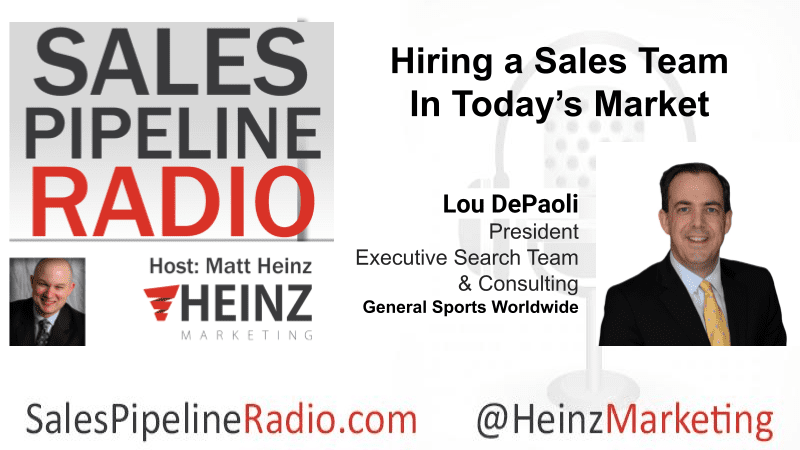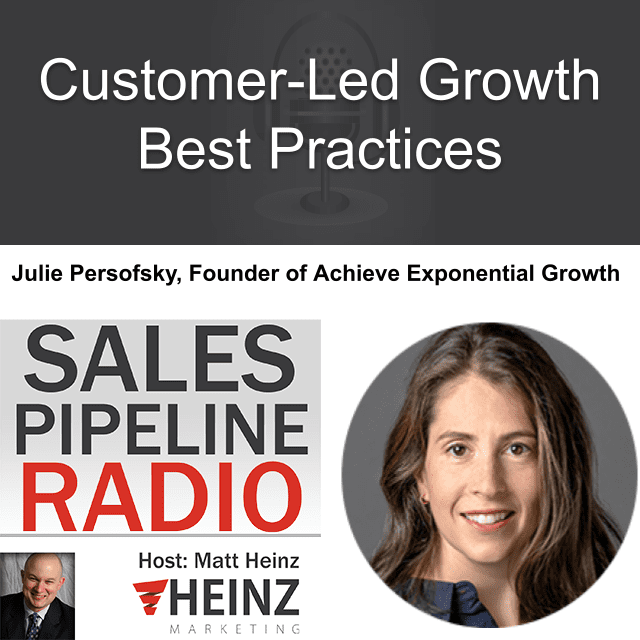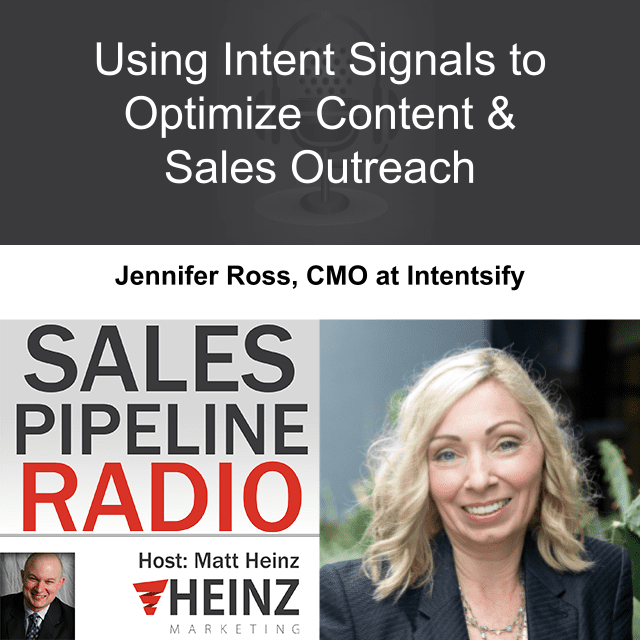Sales Pipeline Radio, Episode 347: Q & A with Lou DePaoli

Summary
Matt interviews the best and brightest minds in sales and Marketing on Sales Pipeline Radio.
By Matt Heinz, President of Heinz Marketing
If you’re not already subscribed to Sales Pipeline Radio or listening live Thursdays at 11:30 am PT on LinkedIn (also on demand) you can find the transcription and recording here on the blog every Monday morning. The show is less than 30 minutes, fast-paced and full of actionable advice, best practices and more for B2B sales and marketing professionals.
We cover a wide range of topics, with a focus on sales development and inside sales priorities. You can subscribe right at Sales Pipeline Radio and/or listen to full recordings of past shows everywhere you listen to podcasts! Spotify, iTunes, Blubrry, Google Play, iHeartRADIO, Stitcher and now on Amazon music. You can even ask Siri, Alexa and Google or search on Audible!
This week’s show is entitled, “Hiring a Sales Team In Today’s Market“ and my guest is Lou DePaoli, President, Executive Search and Team Consulting at General Sports Worldwide.
Tune in to Learn About:
- The changing landscape of hiring sales teams.
- The importance of standing out as a candidate and qualities to look for in sales hires.
- The differences in skill sets within the sales teams in sports organizations and the role of recruiters in the hiring process.
- Lou also shares his book recommendations for sales leaders.
Watch the video, listen in below and/or read the transcript below.
Matt: Welcome everyone to another episode of Sales Pipeline Radio. I’m your host, Matt Heinz. Excited to have you here most Thursdays, 11:30 Pacific, 2:30 Eastern. If you’re joining us live today on Sales Pipeline Radio, thank you so much for joining us in the middle of your workday, middle of your work week. If you are watching or listening on demand, thank you so much for downloading for subscribing. Every episode of Sales Pipeline Radio is available past, present and future at www.SalesPipelineRadio.com. Today, very excited to have with us Lou DePaoli. Lou is the President of General Sports Worldwide and our topic today is hiring, especially hiring sales teams in this crazy environment we find ourselves in. Lou, thanks so much for joining us.
Lou: My pleasure. My thanks for having me.
Matt: Should we talk about the virus going through the GM meetings? Talk about The Hot Stove League a little bit?? I definitely want to talk about hiring. It’s 2023. I remember the beginning of 2022 it was a totally different market. Right? Like you put up a job or you like the candidate, you had to hire them quickly because they probably got snapped up by someone else.
Now you put a job description on LinkedIn and there’s like 400 applicants. Are you seeing that on the sales side as well? Or how has hiring in the sales environment changed?
Lou: You nailed it, Matt. Going back to a year and a half ago to two years ago, you had to hustle quickly to hire people because there was a lot of competition. Everybody was looking, we’re going to bring on good people. Now, you know, when we post jobs online or we post jobs on our own job board, we’re getting hundreds of applicants within a day looking for that opportunity. And it’s a lot of work to go through and filter through and find out the right ones.
And, you know, one of the reasons why we do this on behalf of a lot of our clients in the sports and entertainment industry is because when they post it, and if they have multiple jobs, now they have thousands of applicants coming in. You don’t have the manpower to sort through all of those applications yourself.
So thus a recruiter like ourselves, we get involved and the key really is, when we post opportunities, we make sure that we ask some pretty good questions on the front end. So if you post it on LinkedIn, you post it on a job board, you’re going to get some questions up front that hopefully, you know, if somebody, if there’s five questions and you can’t answer all five of them, or at least three or four of them to a positive, you’d hope that maybe you don’t actually apply for the job if you go over five.
But some people still do and that’s fine. We go through every single one of them, myself and my team, but it’s, it’s definitely worth asking some of those questions up front. So we could screen some of the people out that maybe aren’t qualified.
Matt: I mean, this is a problem for both sides, right? This is a problem if you’re trying to get noticed as an applicant, because if everyone’s going through the same front door, like even if you have advantages that make you better qualified for the job than someone else, it’s even harder to stand out when someone is having to flip filter through like a thousand resumes.
And I’ve had recruiters and hiring managers tell me I’m fine going through 400 applications. A.) I don’t think that’s what you want and B.) how do you really take the time to notice the nuances of the better candidates? I think like it’s a problem for both sides.
So I think I’m curious, let’s tackle them one by one as a candidate. What are things that you recommend candidates do to help them stand out in that kind of environment?
Lou: Yeah, I think there’s a couple of things, depending on how you’re applying. And if it’s on LinkedIn, so for us, um, we actually coach people on this.
If you see us post a job on LinkedIn, don’t be afraid then to connect with me and maybe shoot me a message. “Hey, just to let you know, I applied online and look forward to hearing from you”, like that shows you took a little extra initiative versus you’re just randomly applying for a bunch of jobs and, the scatter and pray type of philosophy.
Right? For candidates, I think there’s a couple of other things. Number 1 you got to make sure that if you’re applying for an opportunity that you’re actually qualified for the opportunity. B, make sure if your resume needs to be attached, it’s in a PDF format, it’s easily readable, right?
There’s just certain just basics that you have to fundamentally get. Make sure that there aren’t typos, just, just little things like that that make it easier. But I also have to say, and I’ve never been one to really put too much emphasis on a really good-looking resume, but I think some of the ones that are a little bit more visually appealing shows that you took a little bit more time, or maybe you hired a professional to help you.
So you’re a little bit more serious about maybe what’s going forward for your career. Those definitely get my attention because when we pop them up in our inbox and we can see the PDF quickly. And it looks really crisp and professionally done, I’m probably going to take that person a little bit more seriously than somebody else until I could at least get the first pass of their resume through.
Matt: So two questions follow up on that. One is, I think in a lot of environments, especially like B2B organizations, or if you’re in an industry where LinkedIn is fairly ubiquitous. I’ve had some people say my LinkedIn profile is my resume. Can you address that and why is a separate resume still important?
Lou: Yeah, we try to tell people and we’ve had people on our own webinars that we’ve done, somebody from LinkedIn sports who came in and told people LinkedIn is not your resume, right? It’s a nice platform to let people know what you do, share some ideas, maybe showcase some of your skills and your talents, but it’s not a resume.
And your resume is a completely different thing than your LinkedIn profile. When I see people’s LinkedIn profiles, it’s just a exact copy of the resume. I worry about a little bit of lack of creativity. LinkedIn is not really the place to be posting: “Exceeded sales quota 42% this year”.
No, no, just overall what you do, what your vision is, who you are, if you have highlights of some of your work, if there’s video, if there’s other things that you can put up there to let people know about who you are as a professional and what you do, great. Then the resume is really meant to be then at that point, the tactical, all the bullet points, all the things you’ve accomplished, et cetera, after that.
So it’s a little bit more of a drill down. Where I think that LinkedIn should be a little bit more of a profile piece.
Matt: Yeah. We’re talking today on Sales Pipeline Radio with Lou DePaoli. He is the President of General Sports Worldwide and talking today about hiring in this crazy environment.
One more question for those that are applying, when it comes to that resume, some of those that I see just end up being a block of text, right? And it’s just a lot of words. It, and if I’m scanning through 400, it’s hard to differentiate things. Some people think I need to put every highlight for my entire career, from every job.
What are some best practices as well as mistakes to avoid on those resumes?
Lou: That’s one of them, right? Don’t just send a text dump with a lot of info and maybe some bullet points. That doesn’t do it. Like I said earlier, it’s got to be visually appealing. And I’ve had, obviously we get tons of resumes that come in through the door.
So I’ve actually earmarked five or six ones that I will turn around and share with candidates to say, “Hey, you have a good resume. You have a good background. Here’s, here’s an actual better format maybe to try. Here’s some best practices from us, from other applicants for jobs”. And I’ll generally take the name out and some of their history and things like that, right?
I’ve had people email me back. This is great. This is really helpful. Thank you. It’s just a simple format and some people don’t put that much thought into it. It’s like, okay, here’s a resume, type it all out, put it all in text, a couple of bullet points. I’ve, I’ve done a data dump. That’s a sales presentation, especially if you’re going for a sales job.
This has to be visually appealing. It’s got to be attractive. You’ve got to engage me. You’ve got to be able to get me to want to call you. Right? So just a white piece of paper with a bunch of text and bullet points and it’s just run on isn’t going to get you too far.
Matt: I sometimes find that like sales roles are really hard to hire for just based on that past experience and resume, right?
You may have been successful selling somewhere else, your success may have had very little to do with your ability to be a successful sales person. It could be, you were just handed great leads. It could be because you’re predisposed to that industry. When you’re looking for sales reps for your clients, what are you looking for , what are some variables that you think have a higher propensity to reflect or, or to turn into someone who’s successful?
Lou: Yeah. Interestingly, you know, so General Sports Worldwide, I think I mentioned, we specialize in the sports and entertainment field. Right. So if somebody is a sales representative for a specific sports organization, that has a history of being very successful on the court or on the field, and they’re a great salesperson there because it’s easy to sell for a team when they’re winning.
So we always looked at the people who were able to thrive and succeed for teams that struggled. Right. Or if you worked in minor league sports for a number of years, like you really have to hustle because people aren’t coming to minor league games to see championship quality baseball or basketball or football on the field.
So if you can show and demonstrate that you can actually sell in a tougher environment, that’s going to get my attention very quickly. If I see something where, I don’t want to mention any teams, you know, because I don’t want to call anybody out, but think of your, your successful sports team that sells out every game and has for the last eight or nine or 10 years, and you’re their top salesperson, how hard is it really to do that job versus going to a team that really struggles and you’ve sold really well, there– great.
How do we find you a job and put you in a spot to really, really thrive?
Matt: What about crossover? I mean, let’s take sports for example. I’m here outside of Seattle. We’ve done some work with the Mariners and you’ve got like ticket sales, you’ve got corporate sales, you’ve got sponsorship sales, one organization, again, baseball teams, these major teams, they’re not huge companies, right?
Like not big sales teams. Is there crossover opportunity or are there unique skills you’re looking for based on the audience they’re selling into?
Lou: You know, there’s definitely crossover opportunities, but you have to really understand what the skill sets are of your people and understand their mentality and then try to steer them towards that right vertical on the sales front. so when you looked at my background, I spent, 16 years in major league baseball, right?
I spent eight years in the NBA, five years in hockey, running sports franchises on the business side. I’m just going to use the example of my team at the Mets. So most recently before doing this, I spent almost eight years as an executive vice president for the New York Mets. My ticketing sales team, when I was there was a little over 80 people.
That’s a lot, right? For a sports team, that’s a lot, but we had it broken down into inside sales, outside sales, premium seating, group sales, retaining season ticket holders, sweep sales. So you have all these different verticals that require different skill sets. So when we would bring somebody into our inside sales program, part of what we coached our inside sales leaders to do was to identify the characteristics of where this person might be a best fit down the road. So once they get through inside sales and they could prove themselves that they know how to sell. Great. This person, Matt has all the attributes of being a great group sales rep. So we’re going to really coach him up a little bit on the group sales side of the business.
Lou is a big game hunter. He’s wants to sell suites. Let’s make sure we put him in suites. Yeah, and then, Mary is really great at retaining season ticket holders and has a very good empathetic approach and logical. Great. We’re going to put her on service and retention. And you have to have that because if not, not everybody can do everything.
But when you can find people that you can cross sell to say, Hey, “you sold groups. Now you can sell a suite. Now you’re going to work in partnership sales”. You know, that’s ideally what we were trying to create for a lot of the organizations that I worked for and for the clients that we work for now.
Matt: So, talking about putting people in the right role based on their skill set, but also creating a bit of a career path, even within an organization to be able to get different skill sets across the way as well.
Just got a couple more minutes here with our guest today, Lou DePaoli he’s the President of General Sports Worldwide., I think a lot of people think of recruiters as critical when it is hard to find candidates. And when the candidates are applying by the hundreds, it’s a lot easier. I could argue the opposite that a good recruiter can really help you find the right candidates.
It’s not just about having access to people and finding the right person. It’s also someone that’s going to stick. Right. And what’s that worth? You talk about like why it’s so important still, even in a market like today to bring someone from the outside to fill key roles.
Lou: Yeah, look, that’s a great question because one thing that we can do is really help– and again, for us and my team, we’ve all worked in professional sports at the team level. We’ve all led sales teams. I’ve been part of sales teams and we know what success looks like. So it’s a lot easier to go in and help one of our clients hire a sales role knowing that we know what that person is, probably long term trajectory looks like. This is a person that will be successful long term because there’s nothing worse than, you play somebody or you hire somebody then you realize 3 or 4 months later it doesn’t work out. That’s obviously expensive from a human capital standpoint from a dollar standpoint.
So you want to make sure you’re getting it right. And I think that’s one of the reasons why in a pretty short period of time, we’ve only been doing search here at General Sports Worldwide for two years and we’ve placed as of this morning, 87 people in about 24 months in the sports and entertainment industry. People know that we know that you’re going to get somebody from us that has a high likelihood of success and a long tail, someone that will be able to stay and develop it and grow.
Because we have those types of network. We know how to suss that out of people when we’re talking to them on the phone for an interview.
Matt: It totally makes sense. Well last question for you, Lou, I think you spent a lot of your career in sales and marketing, go to market roles, a lot of sales leadership, sales management.
Who have you learned from? Who are you reading? Who you recommend other people that are listening here? We get people on the marketing and the sales side. So it, all of it applies. What do you recommend other people check out?
Lou: Wow. I could probably go on for hours talking about all the books that I love to read. My teams always knew that I had a massive library in my office, no matter where I worked.
And I’d always, I encourage people once I got to know them, “Hey, this is a great book for you”. Right. So, as we were trying to build culture, again, some of these books, man, are probably going to be a little bit older, just, just because, hey, I’m getting up there in age, right? But when you find a favorite, you stick with it, right?
So, there’s a couple, you know, that I always recommend to people. Number one, especially for a sales leader, it’s called The No Asshole Rule. And I apologize for swearing, but that’s the name of the book, right? Written by Ben Sutton. It’s a great story about culture and how to build culture that I’ve, I’ve recommended to a lot of people and they always turn around and re recommend it to somebody else.
It’s really smart. The next one is, is Grit, which a lot of people are probably pretty familiar with, right? New York Times bestseller. I had the pleasure of meeting the author and co-author a couple of years back up at West Point when we did a company outing there. Great story, a great book to read about how to overcome things, right?
You got to have that desire to get by and the resilience. And then the third one is also a book that’s probably a little bit older school, but it’s a book called Execution, right? So this is written probably in the early two thousands by, Larry boss city and Ram Sharan are their name are the authors.
It’s, it’s literally, it’s called Execution. The Discipline of Getting Things Done. Because one of the biggest things that I always like to make sure people understand is you can have the greatest ideas, or you can have the greatest sales pipeline, or you could have the greatest skill sets. But if you can’t execute, whether it’s your marketing plan, anything else, you have to be able to get things done.
And that is where I would spend a lot of time telling people that’s something you really got to focus on.
Matt: Absolutely. You don’t have to apologize for old books. To me, one of my favorite marketing books of all time is called Scientific Advertising. It was written by Claude Hopkins in 1923.
Still a great read, still a great read. If you’re a copywriter, if you’re a direct response marketer, still phenomenal. So, Lou, thank you so much for joining us. Where can people learn more about General Sports?
Lou: You know what? They can go to two websites. One of them is www.GeneralSportsWorldwide.Com. And, we have a career development platform, Matt, that’s called The Clubhouse, which is geared towards people looking to get a career in sports with a very robust mentorship program, and that is at www.TheClubHouseCareers.Com.
Matt: That sounds really cool. Well, Lou, thank you very much for joining us today for your generosity and insights. Really appreciate it.
Lou: I appreciate it. Thanks for talking, Matt.
Matt: Absolutely. Thank you everyone for joining us today, for joining us live and for listening on demand. My name is Matt Heinz. We’ll see you next week on Sales Pipeline Radio.
Listen to the Latest Episodes:
Matt interviews the best and brightest minds in sales and Marketing. If you would like to be a guest on Sales Pipeline Radio send an email to Sheena@heinzmarketing.com.



